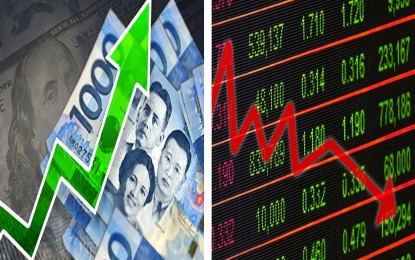
MANILA – The Philippine peso ended the week still on its highest level in over three years on continued US dollar weakness due to rising coronavirus disease 2019 (Covid-19) cases that negatively affected the main equities index.
The local currency finished Friday’s trade at 49.33, its strongest since closing at 49.17 on November 15, 2016. It ended Thursday’s trade at 49.365.
It opened the day at 49.38, sideways from its 49.45 start in the previous session.
It traded between 49.4 and 49.325, resulting in an average of 49.35.
Volume totaled to USD472.5 million, lower than day-ago’s USD481.2 million.
Rizal Commercial Banking Corporation (RCBC) senior economist Michael Ricafort said the peso benefited from the US dollar’s weakness, which is caused by the rising Covid-19 infections as well as the weaker US jobless claims report “that could signal weaker economic recovery amid the spike in new Covid-19 cases in some US states such as in California.”
The US Labor Department on Thursday reported that initial unemployment claims increased to a seasonally adjusted 109,000 to 1.4 million for the week ending July 18, a turn-around from the decline in the past weeks after hitting 6.9 million last March.
Ricafort said the peso also gained from the central bank’s forecast of sustained rise in the country’s gross international reserves (GIR) due to foreign borrowings of both the government and several big companies.
He said the peso strengthened by PHP0.11 or 0.2 percent to a dollar this week while it appreciated by PHP1.305 or 2.6 percent to a dollar since the start of the week.
He forecasts the peso to trade between 49.20 to 49.45 to a dollar next week.
Meanwhile, the Philippine Stock Exchange index (PSEi) slipped for the fourth consecutive day Friday and ended the trade at 6,003.26 points, down by 0.43 percent or 25.75 points.
All Shares declined by 0.20 percent, or 7.01 points, to 3,533.01 points.
It was a mix among the sectors, with Property, Services, and Holding Firms sliding by 1.58 percent, 0.62 percent, and 0.34 percent, respectively.
The Mining and Oil counter rose by 1.46 percent, Industrial by 0.75 percent, and Financials by 0.15 percent.
Volume totaled to 1.31 billion shares amounting to PHP2.94 billion.
Losers led gainers at 93 to 91, while 46 shares were unchanged.
Ricafort said the main equities index posted its lowest level since last June 2 “but nonetheless still among the highest levels” since last March 12.
He attributed the main index’s decline to the uptick in Covid-19 cases in the country that “could adversely affect recovery prospects for both the economy and corporate results of some listed companies.”
“Furthermore, new and upcoming bond and equity issuances could have sapped/funneled some funds in the financial system towards these new fund-raising activities and away from existing issues/securities, thereby could have caused the recent bouts of healthy profit-taking/downward correction,” he said.
Ricafort said PSEi has slipped for the third consecutive week by 85.49 points and by 1,812 points since the start of the year, which “may already reflect some market expectations of declines in net income/results of some listed companies largely due to the Covid-19 lockdowns/pandemic.”
“Record low interest rates locally and in many countries worldwide would still support the search for higher returns/dividend yields in equities/stocks and in other riskier asset classes, amid positive credit rating moves/re-affirmations on the Philippines recently by some of the major international credit rating agencies,” he added.
Ricafort forecasts the main index’s next support level to be at 5,990 level, citing the “major support over the past two months is at 5,850 levels, which help keep the underlying upward trend intact at the moment.”
Among the factors for next week’s trading include the government’s retail treasury bond (RTB) offering, which is scheduled to end on August 7, the initial Real Estate Investment Trust (REIT) offering in the domestic economy, the Covid-19 reports and the rate-setting meeting of the Federal Reserve. (PNA)
